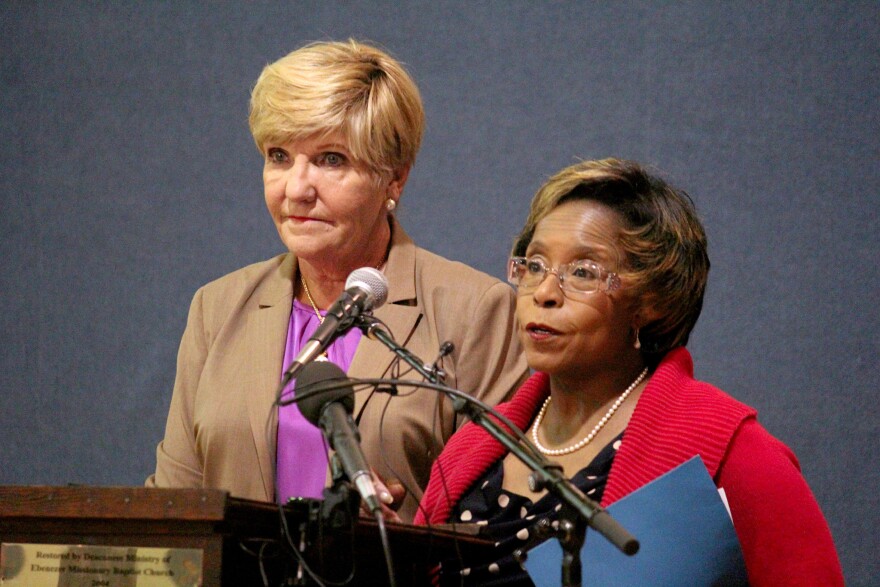Fort Worth City Council members and top city staffers climbed onto a bus Tuesday and took a tour of the Stop Six neighborhood in East Fort Worth. The historic African-American neighborhood has long struggled with high crime, high unemployment and low incomes. Now, the city is trying a new approach to make life better for the people who live there.
In the community room of Stop Six’s Ebenezer Missionary Baptist Church, Mayor Betsy Price rattled off grim statistics that describe the neighborhood – statistics, she said, that simply must be changed: Seventy-eight percent of people living below the poverty line. High school dropout rates at nearly 50 percent in a city that graduates 82 percent of students. Unemployment in Stop Six is over 20 percent, when in the rest of Fort Worth unemployment’s at 4 percent.
These problems, she said, took a long time to develop, and they’ll take time to reverse.
The city is spending $2.5 million to turn things around.
Initially, it’s in the form of a facelift. The mayor said the city is ramping up code enforcement, fixing street lights and trimming back trees. Workers are filling potholes, and police have set up a neighborhood substation.
Price urged residents to get involved and engage with their city leaders, and said the Stop Six community is driving the priorities.

“We’ve listened to you, we’ve got your input on what you’d like to see first,” Price told residents. “And one of the things you mentioned was taking down some of the boarded up houses that the city owns. And more than a few of those have already been demolished and many more will be.”
Residents told the mayor they were happy to see the effort, but many said it felt like it was a long time coming. Keith McDaniel said that over the years, he’s complained about illegal trash dumping and people speeding on his street. But police, he said, are never around to deter crime.
“I sat in my yard for nine hours one day,. I never saw the police come down the street,” he told the mayor and city council members in Stop Six.
The retired city bus driver just wants to see his neighborhood get its fair share of city services.
“I want what they got over there,” he said. “I want the same things. I’m just saying, give me a little more to work with.”
Price acknowledged that the city should’ve given more attention to Stop Six’s struggles.
“This is a starting spot where we’re going to start to address those issues,” she told McDaniel.
Councilwoman Gyna Bivens, who represents the area, said residents should get in touch with their representatives in city council. She said that decisions made there should be made with the input from the community. And, she said, the city needs help knowing where improvements are needed.
Bivens said the short-term improvements going on now in Stop Six are part of the long-term goal of building a safer, healthier and more prosperous Stop Six.
“This is the only part of my district where we have this lag in services, in housing stock, in educational attainment, and all of that goes toward making a community whole,” Bivens said.
Bivens said the city plans to use tax incentives to attract more businesses, tap local universities to help improve education and change city policies to make development easier.
Bivens pushed the city council to remove a historic district designation because she said it added costs for those who wanted to invest in new homes or fix up the ones that were there. The city council approved the change last summer. Now, she said, people who’ve left the neighborhood are looking at the opportunities to come back to Stop Six and help it improve.
“When that historic district overlay was in place, people who wanted to remodel or build couldn’t remodel or build what they wanted,” Bivens said. “Now I see restoration going on in the area.”
The 62 year-old said she remembers when Stop Six was flush with locally owned restaurants and businesses, when homeowners could afford to keep up their houses. That was before it was stereotyped for blight and homelessness and crime. She said she wants to be the council member who starts the journey toward better days.






